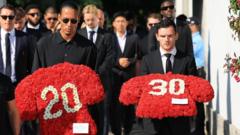As the world mourns the passing of Pope Francis, the Catholic Church begins the complex process of selecting his successor, navigating the future of a faith community deeply impacted by his legacy.
Pope Francis' Funeral Set for Saturday: A Historic Farewell

Pope Francis' Funeral Set for Saturday: A Historic Farewell
The Vatican announces preparations for a modest yet significant farewell to Pope Francis, altering traditional practices for the burial of the pontiff who championed humility.
April 22, 2025, 7:01 a.m. ET
Pope Francis, known for his humble approach both in life and in death, is to be laid to rest in a simplified ceremony at St. Peter’s Basilica this Saturday. The funeral will diverge from long-standing Vatican traditions that typically surround papal burials.
Since the news of his passing at age 88 from a cerebral stroke, cardinals from across the globe have gathered in Vatican City to pay their respects and initiate discussions about the next steps for the Catholic Church. Cardinal Giovanni Battista Re convened the College of Cardinals for their first meeting shortly after Francis’ death, setting into motion the intricate process typical of a papal funeral, which includes a period of lying in state prior to the final rites.
Prior to his death, Pope Francis had chosen to be interred in a simple coffin as a symbol of his modest lifestyle, which he maintained even in the opulent environment of the Vatican. His body will be transported to St. Peter’s Basilica ahead of the funeral where he will be memorialized with a mass articulated around simplified rituals established by the Pope himself.
Political figures and religious leaders from around the world are expected to attend the funeral, marking a moment of global unity amidst the stark political landscape that diverged from what Francis experienced during his papacy. Among the notable attendees anticipated is former U.S. President Donald Trump, whose presence raises logistical considerations given the scale of his entourage.
In the wake of Pope Francis’ legacy, the church’s future now rests in the hands of the cardinals, 135 of whom will cast their votes behind closed doors to determine his successor, a task complicated by shifting political and ideological currents within both the church and the wider world.
As nations implement official mourning periods, memorial services are being held in numerous countries, honoring a pontiff who aimed to bridge divides and advocate for marginalized communities. Countries such as India and Argentina have declared days of mourning, while funeral services across cathedrals—from the bustling streets of Manila to the serene atmosphere of Caracas—highlight the depth of his global influence.
Among tributes to Pope Francis, his notable attempts to amplify voices unheard, especially amongst the elderly and marginalized, are frequently recounted. He challenged societal views surrounding aging, advocating instead for dignity and respect, and was an outspoken critic of the treatment of vulnerable populations worldwide.
As the world reflects on Pope Francis’ contributions, speculation builds around who the next pope will be. Names like Cardinal Pietro Parolin, the Vatican’s secretary of state, and Cardinal Luis Antonio Tagle, a prominent figure from the Philippines, emerge as potential successors who may either continue or alter the direction set during Francis’ historic tenure.
As Pope Francis is remembered for his humility and compassionate outreach, the Catholic Church stands on the precipice of a pivotal transition, with both hope and uncertainty defining the path ahead.
Pope Francis, known for his humble approach both in life and in death, is to be laid to rest in a simplified ceremony at St. Peter’s Basilica this Saturday. The funeral will diverge from long-standing Vatican traditions that typically surround papal burials.
Since the news of his passing at age 88 from a cerebral stroke, cardinals from across the globe have gathered in Vatican City to pay their respects and initiate discussions about the next steps for the Catholic Church. Cardinal Giovanni Battista Re convened the College of Cardinals for their first meeting shortly after Francis’ death, setting into motion the intricate process typical of a papal funeral, which includes a period of lying in state prior to the final rites.
Prior to his death, Pope Francis had chosen to be interred in a simple coffin as a symbol of his modest lifestyle, which he maintained even in the opulent environment of the Vatican. His body will be transported to St. Peter’s Basilica ahead of the funeral where he will be memorialized with a mass articulated around simplified rituals established by the Pope himself.
Political figures and religious leaders from around the world are expected to attend the funeral, marking a moment of global unity amidst the stark political landscape that diverged from what Francis experienced during his papacy. Among the notable attendees anticipated is former U.S. President Donald Trump, whose presence raises logistical considerations given the scale of his entourage.
In the wake of Pope Francis’ legacy, the church’s future now rests in the hands of the cardinals, 135 of whom will cast their votes behind closed doors to determine his successor, a task complicated by shifting political and ideological currents within both the church and the wider world.
As nations implement official mourning periods, memorial services are being held in numerous countries, honoring a pontiff who aimed to bridge divides and advocate for marginalized communities. Countries such as India and Argentina have declared days of mourning, while funeral services across cathedrals—from the bustling streets of Manila to the serene atmosphere of Caracas—highlight the depth of his global influence.
Among tributes to Pope Francis, his notable attempts to amplify voices unheard, especially amongst the elderly and marginalized, are frequently recounted. He challenged societal views surrounding aging, advocating instead for dignity and respect, and was an outspoken critic of the treatment of vulnerable populations worldwide.
As the world reflects on Pope Francis’ contributions, speculation builds around who the next pope will be. Names like Cardinal Pietro Parolin, the Vatican’s secretary of state, and Cardinal Luis Antonio Tagle, a prominent figure from the Philippines, emerge as potential successors who may either continue or alter the direction set during Francis’ historic tenure.
As Pope Francis is remembered for his humility and compassionate outreach, the Catholic Church stands on the precipice of a pivotal transition, with both hope and uncertainty defining the path ahead.





















